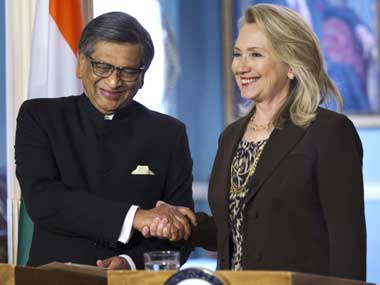New York: When the US and India signed the nuclear deal in 2008, it was heralded as a new era in post-Cold war ties and US companies hoped to reap a bonanza in reactor sales. They have been snagged by Manmohan Singh’s government but US Secretary of State Hillary Clinton confirmed on Wednesday that Westinghouse Electric Co. has signed a memorandum of understanding with the Nuclear Power Corporation of India (NPCIL) that would pave the way for construction of nuclear power plants in Gujarat. Westinghouse has decided to go ahead with plans for building an AP-1000 nuclear power plant in Gujarat. As the strategic dialogue opened Clinton said that the American company and the Indian state run firm signed a pact on Tuesday to work towards preliminary licensing and site development in Gujarat for construction of new reactors. [caption id=“attachment_343011” align=“alignleft” width=“380” caption=“Clinton described this development as significant and Krishna said he hoped it would dispel questions about India’s commitment to implementing the US-India civil nuclear agreement. AP”]  [/caption] US frustration with India’s domestic nuclear liability laws is well known. America has been long-faced about India’s legislation, which it contends is tough on suppliers of reactors. American nuclear power firms have been unwilling to shoulder the kind of liabilities that India was insisting on under its domestic legislation, the US government — including President Barack Obama — had taken up their problems at the highest level in New Delhi. Diplomats from Washington have been in talks with their counterparts in New Delhi over how liability is determined in an accident. Clinton’s announcement shows that intense follow up exchanges by lawyers representing both sides to iron out what companies like Westinghouse saw as sticking points in India’s nuclear liability law have been at least partly successful. Clinton described this development as significant and External Affairs Minister SM Krishna said he hoped it would dispel questions about India’s commitment to implementing the US-India civil nuclear agreement. The agreement between Westinghouse and NPCIL is proof that “tangible progress” is being made in the implementation of the nuclear deal, said Krishna. In 2010, India’s parliament passed a nuclear liability act that made companies liable to pay compensation without monetary limit in the event of a nuclear accident. But India posted new rules in November last year, called Civil Liability for Nuclear Damage Rules 2011, effectively limiting the liability on foreign suppliers and imposing time constraints on claimants seeking compensation. The new rules implementing the act have laid a cap of Rs 1,500 crore as damages that can be claimed by a plant operator from reactor suppliers in the event of faulty equipment causing an accident. The rules also set a five-year time limit within which the operator can claim damages from the supplier. This is a departure from the earlier clause in the nuclear liability bill that made nuclear equipment suppliers liable for 80 years in the event of an accident.
US Secretary of State Hillary Clinton confirmed on Wednesday that Westinghouse Electric Co. has signed a MoU with the Nuclear Power Corporation of India that would pave the way for construction of nuclear power plants in Gujarat.
Advertisement
End of Article


)

)
)
)
)
)
)
)
)



